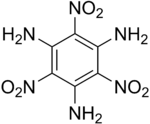TATB
 |
|
 |
|
| Names | |
|---|---|
|
IUPAC name
1,3,5-triamino-2,4,6-trinitrobenzene
|
|
| Identifiers | |
|
3058-38-6 |
|
| 3D model (Jmol) | Interactive image |
| ChemSpider |
17272 |
| ECHA InfoCard | 100.019.362 |
| PubChem | 18286 |
|
|
|
|
| Properties | |
| C6H6N6O6 | |
| Molar mass | 258.15 g/mol |
| Appearance | Yellow or brown powdered crystals (rhombohedral) |
| Density | 1.93 g/cm3 |
| Melting point | 350 °C (662 °F; 623 K) |
| Explosive data | |
| Shock sensitivity | Insensitive |
| Friction sensitivity | Insensitive |
| Detonation velocity | 7350 m/s |
|
Except where otherwise noted, data are given for materials in their standard state (at 25 °C [77 °F], 100 kPa).
|
|
|
|
|
| Infobox references | |
TATB, triaminotrinitrobenzene or 2,4,6-triamino-1,3,5- trinitrobenzene is an aromatic explosive, based on the basic six-carbon benzene ring structure with three nitro functional groups (NO2) and three amine (NH2) groups attached, alternating around the ring.
TATB is a powerful explosive (somewhat less powerful than RDX, but more than TNT), but it is extremely insensitive to shock, vibration, fire, or impact. Because it is so difficult to detonate by accident, even under severe conditions, it has become preferred for applications where extreme safety is required, such as the explosives used in nuclear weapons, where accidental detonation during an airplane crash or rocket misfiring would present extreme dangers. All British nuclear warheads, except those where weight is a factor, are believed to use TATB-based explosives for main explosive charges. According to David Albright, South Africa's nuclear weapons used TATB to increase their safety.
TATB is normally used as the explosive ingredient in plastic bonded explosive compositions, such as PBX-9502, LX-17-0, and PBX-9503 (with 15% HMX). These formulations are described as Insensitive High Explosives or IHE in nuclear weapons literature.
Though it could theoretically be mixed with other explosive compounds in castable mixtures or other use forms, the applications for such forms would be unclear since they would largely undo the insensitivity of pure TATB.
...
Wikipedia
